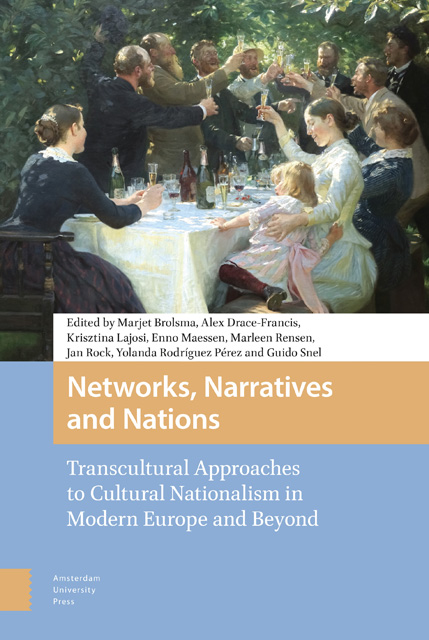 Networks, Narratives and Nations
Networks, Narratives and Nations Book contents
6 - The Nation as a Network: Rizaeddin Fakhreddinov’s Islamic Biographies
Published online by Cambridge University Press: 16 November 2022
Summary
Abstract
This chapter discusses the biographical work of the well-known Tatar historian, publicist and Islamic authority Rizaeddin Fakhreddinov (1858–1936). I focus on Fakhreddinov's biographical compendium Āthār (Monuments), and suggest that Fakhreddinov understood the Tatar nation as a network of an Islamic elite with overlapping religious, family and business links. I then go on to analyse the fate of the third volume of Āthār, which Fakhreddinov could not publish during his lifetime and to which he added materials and notes up to the last years of his life. Āthār III began in 1906/11 as a celebration of the pious Tatar nation, but it soon reflected Fakhreddinov's despair over the Bolsheviks’ destruction of the Muslim elite – and of Islam.
Keywords: Muslim biographies; Volga-Ural region; Imperial Russia; Tatar historiography; Muftiate; Soviet nationality policy
A Web of Pious Biographies
For historians of Muslim societies in eastern Europe, collections of Islamic biographies are a major source of information. Among the Tatars of the Volga-Ural region, this genre became fashionable in the last decades of the nineteenth century. Ḥusayn Amirkhanov's Tavārīkh-I bulghāriyya (Volga-Bulghār Chronicles), published in Kazan in 1880, contained legends but also biographical sections on personalities of the nineteenth century. The first book that completely focused on biographies of Islamic personalities from the Volga region – imams, shaykhs and authors of religious works, mostly from the eighteenth and nineteenth centuries – was the second volume of Mustafād al-akhbār (Useful Information), composed by the Kazan theologian and historian Shihābaddīn al-Marjānī (1818–1889) and published posthumously in 1900.
Rizaeddin Fakhreddinov (Riḍā’addīn bin Fakhraddīn, 1858–1936) was clearly inspired by Marjānī, whom he regarded as his model in critical Islamic scholarship and historical text analysis. In his multivolume biographical compendium Āthār (Monuments), Fakhreddinov significantly enlarged Marjānī's scope and source base, as well as chosing a different format. Marjānī, working in Kazan, had clustered his biographies according to the village communities where the respective imams and teachers worked, thereby essentially producing a history of Muslim communities of the Kazan area through the lives of their imams. Fakhreddinov included many more personalities, and he arranged his material not geographically but chronologically, by years of death. As a result Fakhreddinov's Āthār covers a wider geographical area, with more philological detail and historical depth.
- Type
- Chapter
- Information
- Networks, Narratives and NationsTranscultural Approaches to Cultural Nationalism in Modern Europe and Beyond, pp. 85 - 96Publisher: Amsterdam University PressPrint publication year: 2022
